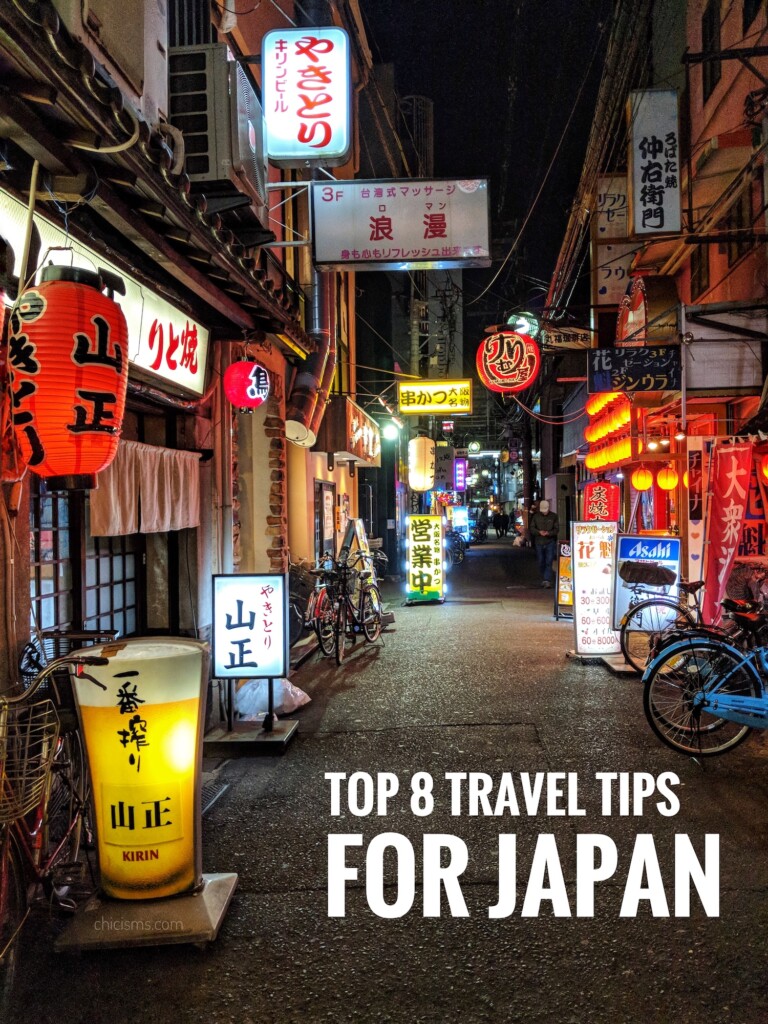Japan is nothing short of a wonderland. The food is excellent, the cities are extremely clean and there’s so much to see and do!
If you’re planning a trip to Japan, or even thinking about visiting, below are 8 travel tips that I found the most helpful on a recent trip to the country.
1. Pocket Wi-Fi will be your best purchase. Before you take off on your flight, order a pocket wi-fi and pick it up at the airport once you land in Japan. Pocket wi-fi is extremely helpful because it’s portable, runs on battery, and lets you access wi-fi from your mobile devices almost anywhere. This is great when you’re trying to navigate a completely new city (and country!) since you’ll be able to use Google Maps and an internet browser to look up places to go, while on the go.
We used Pupuru Wi-Fi and had no complaints. It lasted almost all day (8-9 hours) on a full charge while we were out exploring.
2. Walk or take public transportation. Japan’s public transportation system is amazing — it’s always on time, so clean and makes traveling within the country simple. I strongly suggest you take the subway, trains, or even just walk around. Walking from place to place gives you the opportunity to explore all the neighborhoods and hidden alleyways with bars/restaurants/shops that you probably wouldn’t have come across otherwise.
3. Bring a plastic bag with you for trash. I don’t think we saw one public trash can as we walked through five cities in Japan. The country is extremely clean, but you probably won’t find a trash can out in the open (you will find vending machines, but that’s another story). As you’re walking through the cities, you’ll probably accumulate some trash from shops, food vendors and more, so bring along a small plastic baggie like a ziploc bag with you to throw them away while you’re on the go. You can throw all of this away in a convenience store or at your hotel/Airbnb at the end of the day.
4. Purchase a Japan Rail Pass. If you’re planning to hop from city to city and take the shinkansen, purchase a Japan Rail Pass. It was about $278 USD per person (at the time of this post) for a 7-day pass and you can use your rail pass to pay for any JR train (except the Mizuho and Nozomi Shinkansen). You’ll need to purchase the pass before you arrive in Japan, so buy it at home before your trip.
Cost-wise, it made more sense to purchase the JR Pass instead of purchasing individual train tickets separately, especially if you plan on taking the Shinkansen.
5. Bring cash! Japan is predominately a cash-only economy, so make sure to bring extra cash with you. This may have shifted slightly during the pandemic as cashless payments became more popular, but I’d still err on the side of bringing some cash just in case.
Especially if you’re planning on strolling through markets, street vendors, and eating ramen. You’ll be reaching for your yen and coins instead of a card more than you know.
Speaking of coins, it’s helpful to bring a little coin pouch with you (or buy one in Japan). I’ve never used coins as much as I did in Japan and having them all in one pouch made it much easier for purchases.
6. Convenience stores are great in Japan. I never thought I would recommend anyone to walk into a 7-Eleven but here we go. There was at least one convenience store (or ‘konbini’) on every couple of blocks – the most popular ones you’ll see are 7-Eleven, Lawson and Family Mart.
But the thing is, the convenience stores in Japan aren’t just like your 7-Eleven in the states. The konbini are actually enjoyable, and even fun to be in. You’ll find the usual items in a Japanese convenient store like chips, toothbrushes and drinks, but you’ll find so many interesting options for all of those products. You can also stop in to grab a quick bite to eat, with items like freshly made rice balls (onigiri), sandwiches and pastries.
They also have ATMs where you can exchange or withdraw money (helpful for tip #5!).
7. Lockers at Train Stations. Most of the train stations in Japan have coin lockers that you can stash your backpack or suitcases in. This is incredibly helpful if you’re traveling between cities and need a place to put your bag down so you can explore the city before checking into your hotel or Airbnb.
Depending on how large your locker is, they only cost about 300 – 500 yen for the day. It’s as easy as finding an open locker, dropping your stuff in it, locking it, and paying for the locker. Just remember where your locker is since the train stations are pretty large.
8. Train stations are malls. If you have no where to be, getting lost in a train station isn’t such a bad idea. The train stations are so large and inside you’ll find grocery stores, great food to take out, clothing stores and so much more. Major train stations also have a shopping area that’s multiple floors (we’re talking 8 or 9). It’s really just incredible to be in the middle of it all.
Any other tips or thoughts? Let me know in the comments. Happy traveling!





Leave A Comment